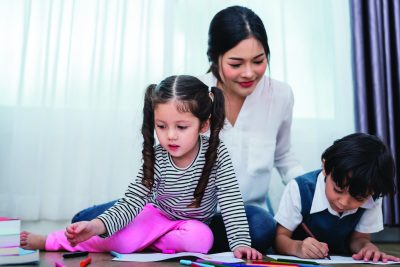When it comes to learning, every child learns at a different pace. Any gaps in a child’s ability to learn usually show up once he or she starts going to kindergarten.
One yardstick used to measure a child’s academic capability is known as 3M (menulis, membaca, mengira), which refers to the core skills of reading, writing and arithmetic. This year, some parents of young children who had to transition from kindergarten to primary school may have had worries because of the closure of kindergartens and pre-schools due to the COVID-19 pandemic.
While this disruption may have affected the learning process, these challenges can be addressed, and by working together, parents and educators can assist a child to overcome any learning lag. That said, if you notice that your child consistently struggling to learn or understand things, then it’s crucial to find the underlying, root cause.
Spot it early
Parents need to know if their child’s growth and development is progressing normally. This is only possible if you keep track of your child’s key developmental milestones starting from birth.
Consultant Paediatrician Datuk Dr Zulkifli Ismail explains, “Parents, especially first-time parents, should be familiar with important milestones such as when an infant should start talking, recognising letters of the alphabet, and so on. This will help you quickly identify any significant delays or difficulties in learning how to read, talk, or associate letters with sounds.”
Important milestones parents should be aware of: CLICK HERE
If you notice any delays, don’t ignore it or “wait and see”. Developmental delays (especially reading, language or social skills) are sometimes caused by problems with a child’s hearing or vision, so it’s best to spot these problems early on. Highlight any concerns with your child’s paediatrician to get professional help in confirming if this is the problem, or if it is indeed a learning disability.
Datuk Dr Zulkifli suggests, “If you’re not sure what to ask your paediatrician, just voice your concerns. Be as specific as possible in describing your observations of your child’s development and behaviour, as these are very helpful clues.”
Do note that while children with Down syndrome, autism spectrum disorder and brain trauma/injury often face problems with learning, these conditions are not considered a learning disability.
There are specific types of learning disabilities, such as dyslexia (affects reading/writing), dyspraxia (affects motor skills), and dyscalculia (affects math ability). In 2015, Malaysian students were screened by the Ministry of Education and an estimated 7% were diagnosed with dyslexia.
The Positive Parenting Chairman adds, “Parents must continue to remain vigilant. Some learning disabilities such as dyslexia may only become apparent from kindergarten onwards. Continue spending quality time with your child – not only will it be a boon to establishing a closer parent-child bond, it also makes it easier for you to quickly identify any potential problems in her future development.”
Learn in different ways & at his own pace
A learning disability (also known as specific learning disability) is a significant and ongoing difficulty with one or more areas of learning. This can lead to greater learning difficulties, but in no way is it due to low intelligence.
Intellectual disabilities are caused by impaired general IQ, which can lead to learning difficulties and is not limited to just academic performance but can be seen across other areas of development as well. Signs of developmental delays include delays in early language, fine motor skills and independent self-care from an early age, even starting school.
Developmental and Behavioural Paediatrician Dr Cindy Chan points out, “A child with a specific learning disability often has a normal IQ; some are very bright intellectually. Yet without the right support, she will struggle to keep up with her peers. This can affect her self-esteem and have a negative long-term impact on staying engaged with school or learning.”
It is important to identify the underlying intellectual and learning profile of each child. Some children may have more than one type of learning disability, thus accurately identifying them will help in planning an effective education plan. It is far more crucial that your child receives extra support compared to confirming the diagnosis of what she has.
Coping with your child’s learning disability will often comprise several approaches. There is no one-size-fits-all approach to intervention as it should be individualised and must allow for an intensity and length of time according to the child’s needs. Practical strategies include behavioural approaches (e.g. building in regular physical breaks during lessons), compensatory accommodations (e.g. use of voice-to-text apps for dyslexics, keyboard and laptop for students with significant handwriting difficulty), and environmental accommodations (e.g. preferential seating near the teacher’s desk or allowing a small fidget item for kids who have trouble focusing during lessons) .
Do talk with an expert to prepare specific interventions to help support and remedy the issues, for instance using systematic instructions to teach literacy. By providing early and effective support for a sufficient time, it can really help narrow the gaps in his or her school readiness, and promote crucial foundations in literacy and numeracy. Approach it systematically and take baby steps while providing clear and systematic instructions on how she is to achieve them. Repeat as often as required and have regular revisions consistently.
Communicate closely with your child’s teachers and paediatrician. At the same time, keep track whether the methods are helping your child cope with her learning. This information will be useful to continuously fine-tune goals and strategies.
Famous & dyslexic
Learning disabilities do not limit a person’s ability to succeed in life. Some successful people with dyslexia include Orlando Bloom, Whoopi Goldberg, Kiera Knightly and Steven Spielberg.
Dr Cindy also suggested some tips for parents:
- Be mindful of your language. Hold it in and avoid negative words (e.g. lazy, stupid, etc.) when discussing her performance or attitude. A learning disability means difficulties in grasping conventional academic approaches. To cope, she should be taught using an often different approach and given more time to practice and master the skills taught.
- Know her limitations. Focus on her strengths while finding specific ways to enable her to input and output her learning. For example, children with dysgraphia often have trouble writing. Seek to provide appropriate supports – occupational therapy to improve eye-hand coordination, applying for school accommodations such as asking the teacher to provide printed lesson handouts or allowing the use of a laptop to type notes in class.
- Temper your expectations. As parents, always remember that every child is different. Some children handle frustration and setbacks better than others, so tailor your expectations and responses according to her learning profile and abilities. Set the bar just high enough to challenge her but not too high that it becomes unattainable. Knowing and understanding her personality makes it easier for you to motivate her to do her best.
- Involve your child in some decision making. This is a shared journey that requires two-way conversations with your child. Encourage him to also come up with ideas or strategies he may want to try. This is an important aspect of learning – making mistakes and learning what works for himself.
- The process is more important than the outcome. Give honest and specific praise whenever she puts in good effort and perseveres. Don’t just look at results; continue to be supportive of interests outside academics. Apart from music, arts or sports, think about providing opportunities and experiences that may shape ideas for innovative employment in future such as a passion for environmental sustainability, animal care and digital creative, to name a few.
- Manage unwanted behaviours. Learn appropriate strategies to manage negative behaviours. Having a good communication with your child will provide insights on adjusting her learning environment to be more effective and less stressful.
The role of teachers
The school environment and educators also play a large role in helping children with learning disabilities stay on track academically. Parents need to actively work hand-in-hand with teachers, so don’t miss parent-teacher meetings and keep tabs on how your child is doing at school by communicating regularly with her teacher.
Pn Anisa Ahmad, President of the Association of Registered Childcare Providers Malaysia (PPBM) remarks, “Children with learning disabilities should ideally be enrolled in an appropriate school as attending a ‘normal’ school will not be conducive to their learning. They may face problems such as being bullied or alienated by their peers, and teachers in a regular school may also lack the experience to handle kids with learning disabilities.”
“There are inclusive programmes for early childhood care and education in TASKA (Taman Asuhan Kanak-kanak, or nursery) and TADIKA (Taman Didikan Kanak-kanak, or kindergarten) where children will have empathy and recognition toward their special-needs peers. The childcare providers and teachers need to learn early intervention programmes, so that early detection and stimulation can be done. PPBM together with the Malaysian Ministry of Health are working together in making module for this and we already submitted proposal to the Ministry of Women, Family and Community Development to train the childcare providers and teachers.”
It can be expensive to send a child to a private school specialising in teaching children with learning disabilities, but you can opt for public schools that cater to children with learning disabilities such as dyslexia. The National Health and Morbidity Survey 2019 found that 4.7% of children in Malaysia has disabilities (about 430,000 children), but only 74,694 have access to inclusive education in public schools. There should be access and quality of a range of tertiary education options such as technical and vocational education and training (TVET) for these children. Therefore the government still needs to strengthen its role in this aspect.
As a TASKA advisor, she adds, “It’s also been shown that parents and caregivers of children with learning disabilities face greater stress and negative caregiving consequences than those with typically developing children. Do consider joining parental support groups. Facing hardship with the support of other parents who have encountered similar difficulties can make a big difference, even if it is just someone who can lend an ear to their troubles.”
Resources for parents:
A parent for life
Regardless of what your child’s learning disability may be, stay focused on nurturing her gifts and interests. Be supportive and most importantly, provide her with unconditional love and support too!
Provide positive feedback and approval based on positive behaviours. Any praise you give should always be honest and most importantly, specific. Just a generic “good girl” loses any meaning after numerous repetitions. Also, when it comes to your expectations, be careful to match them with her aptitude and capabilities.
Since parenting can be demanding and stressful, be sure to take care of your own health and mental wellbeing. Take occasional breaks from your day-to-day routine to help you maintain the right state of mind, and to enable you to continue providing proper care for your child. Yes, life might be tougher but with the right support and preparation, you can do it!
“At the end of the day, the most overwhelming key to a child’s success is the positive involvement of parents.” – Jane D. Hull










Comments